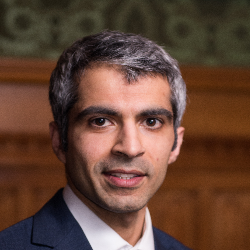“The Social Metrics Commission’s report, and their analysis of YouGov polling included within it, demonstrate the power of data. The analysis has highlighted a rise in deep poverty prior to the covid-19 pandemic – something that would have been hard to uncover under previous poverty measures – and the survey data shows that these people who are struggling most will be hit hardest by the economic fallout from covid-19. What gets measured gets managed, so the Commission’s work is a vital step in understanding the lived experience of those in poverty, so that we can effectively tackle it.”
Stephan Shakespeare, SMC Commissioner and CEO & Co-Founder of YouGov plc


“People’s experience of coronavirus has been unequal. The Government also needs to reflect on what type of economy and society we want coming out of this. It is more important than ever that we align behind an effective poverty measure to hold the Government to account.”
Deven Ghelani, SMC Commissioner and Director and Founder of Policy in Practice
“The increase in families living in deep poverty should be of great concern. This not only means more families who are struggling to get by on a daily basis, but it will help to entrench disadvantage and reduce social mobility.”
David Laws, SMC Commissioner and former Schools Minister


“For a society that values compassion and justice, news that the proportion of people locked in deep poverty has increased over the last 20 years must act as wake-up call. That the pandemic has also hit those living in deep poverty hardest only sharpens the need for urgent action.
“In recent years, rising employment helped to protect some from poverty, especially deep poverty, but too many were still trapped. Poor quality work was a drag on our economy and held people back from a decent standard of living. Low pay, too few hours of work, lack of skills and high rents pulled people down, while cuts to social security meant it did not act as the anchor we should all be able to rely on when times are tough.
“Now, job vacancies are in short supply, unemployment is set to rise and too many people in poverty are frozen out of decently paid jobs because of low skills. The government must put good jobs at the centre of its plans for economic recovery – the last decade of in-work poverty and poor productivity has shown that aiming for high employment is not enough.”
Helen Barnard, SMC Commissioner and Acting Director at the Joseph Rowntree Foundation
“We welcome this latest report from the SMC, which shines a light on the deep poverty being faced by so many people in the UK today. The number of people in deep poverty has risen by 1.7 million over the last two decades, while the overall rate of poverty, in contrast, has changed relatively little over the same period.
“We know that the prevalence and experience of multiple disadvantage is closely correlated to poverty and deprivation. As the government and local areas plan for the next stage of the response to the coronavirus crisis we must ensure that polices to reduce poverty are at the heart of local and national responses.
“Measuring progress will require the adoption of a clear and consistent measure of poverty, which the Commission’s metric can provide.”
Oliver Hilbery, SMC Commissioner and Director of the MEAM coalition


“It is very good to see the latest SMC report with new data on trends in the depth of poverty. However, as there has been no specific ambition to reduce child poverty since 2010, we need to see serious and urgent action with tangible commitments from the administration to address the SMC findings in relation to children.”
Leon Feinstein, SMC Commissioner and Professor of Education and Children’s Social Care at the Rees Centre, University of Oxford
“Measuring Poverty shows that poverty remains a significant issue in the UK. The report correlates with findings from the Trust’s London’s Poverty Profile that poverty rates continue to be higher in London than any other region in the UK. As we emerge from the current crisis, we must all work together to ensure that no one has to live a life of poverty, and that social and economic prosperity is shared more equitably.”
Bharat Mehta CBE, Chief Executive of Trust for London
“These new figures – which show that nearly a third of people in poverty are living on less than half of what they would need simply to get above the poverty line – should appal us all. Living in poverty has a hugely damaging effect on children’s lives, leaving them more likely to experience low well-being, poor mental health and with poorer future prospects. Without substantial intervention the coronavirus will undoubtedly unleash further harm to the poorest in society. There is no time to waste. The Government must end the five week wait for Universal Credit, suspend the No Recourse to Public Funds condition which prevents many families from accessing mainstream benefits, and they must make a long term funding commitment for local welfare assistance schemes to ensure families have somewhere to turn if they need emergency financial support. Measures such as these would prevent deepening levels of poverty and protect children from needlessly suffering the destitution and disadvantage this report reveals.”
Dr Sam Royston, Director of Policy and Research at The Children’s Society
“It’s shocking that almost half of the families in poverty have a disabled person in them. This report highlights the reality that life really does cost more if you’re disabled. We know that many disabled people and their families experience a lower standard of living and we fear that life will get even harder for them following the coronavirus pandemic. Disabled people are having to make really tough choices about what essentials to go without each month. There is an urgent need for Government, policy makers and businesses to work together to support the millions of disabled people and their families who are living in poverty. We cannot afford to forget the needs of disabled people.”
James Taylor, Executive Director of Strategy, Impact and Social Change at Scope
“The SMC shines a detailed light on poverty and reveals a stark picture. We know that depth and persistence of poverty are closely associated with education and employment outcomes, and high levels of deep poverty are a ticking time bomb for the future. As with so many areas of policy, focussing on headline figures can hide a multitude of problems. In employment, in education, and in poverty, we need a greater focus on the details to inform effective solutions, especially for people who need support the most.”
Sam Windett, Director of Policy at Impetus
“The rise of deep poverty in twenty-first century Britain is an appalling failure of public policy. This work is a wake-up call: as we rebuild Britain after coronavirus, we need to develop a stronger social security system to better support those who endure much misfortune. The deep, disproportionate cuts to working-aged benefits that we saw in the aftermath of the 2008 financial crisis cannot be repeated when the Government eventually seeks to repair the public finances in the 2020s.”
Ryan Shorthouse, Founder and Chief Executive of Bright Blue